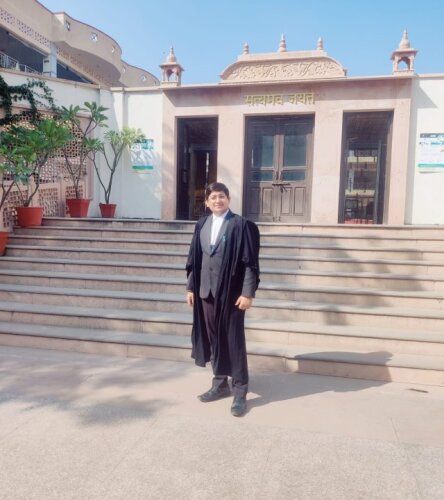Best Faith-Based Law Lawyers in Jaipur
Share your needs with us, get contacted by law firms.
Free. Takes 2 min.
List of the best lawyers in Jaipur, India
About Faith-Based Law in Jaipur, India
Faith-Based Law in Jaipur, India, is rooted in the diverse religious traditions and legal systems that govern different communities. This involves the personal laws stemming from the major religions in India, such as Hinduism, Islam, Christianity, and others. These laws govern various aspects of life, including marriage, divorce, inheritance, and adoption, and are administered alongside the secular legal system of India. The ethnic and cultural diversity of Jaipur makes it unique in its application and understanding of Faith-Based Law, where traditional laws intertwine with the city's legal framework.
Why You May Need a Lawyer
There are several reasons why individuals might need legal assistance in Faith-Based Law in Jaipur:
- Marriage and Divorce: Navigating the complexities of religious marriage and divorce laws, especially in mixed-faith marriages.
- Inheritance: Understanding one's rights under personal inheritance laws, which might differ significantly from the secular laws.
- Adoption: Managing the legal procedures and religious implications of adopting under faith-specific guidelines.
- Religious Disputes: Resolving conflicts that arise from religious obligations and their interpretation under law.
- Conversion: Handling legal issues related to religious conversions and their effect on personal law status.
Local Laws Overview
In Jaipur, as in the rest of India, Faith-Based Law is predominantly guided by the principles outlined in the respective personal laws of different communities:
- Hindu Law: Governed by texts such as the Hindu Marriage Act, 1955, and the Hindu Succession Act, 1956.
- Muslim Law: Based primarily on Sharia principles, including the Muslim Personal Law (Shariat) Application Act, 1937.
- Christian Law: Encompassed within the Indian Christian Marriage Act, 1872, and the Indian Divorce Act, 1869.
- Special Marriage Act, 1954: Provides a framework for interfaith marriages and civil marriages outside religious requirements.
Frequently Asked Questions
What is Faith-Based Law in India?
Faith-Based Law in India refers to the personal laws that are derived from religious teachings and traditions, applicable to different communities for matters such as marriage, divorce, and inheritance.
Which personal law applies to Hindus in Jaipur?
The Hindu law applies to Hindus in Jaipur, including the Hindu Marriage Act, 1955, and the Hindu Succession Act, 1956.
Can a person choose which personal law they want to follow?
Personal law is generally determined by one's religion, but individuals may choose to marry under the secular Special Marriage Act, which is applicable to all Indians regardless of religion.
How does the Indian legal system handle interfaith marriages?
Interfaith marriages can be solemnized under the Special Marriage Act, which allows for a civil marriage without conversion to either spouse's religion.
Is it possible to convert to another faith and change the applicable personal law?
Yes, conversion to another religion can affect which personal law applies to an individual, particularly regarding marriage and inheritance.
What is the role of religious leaders or priests in Faith-Based Law?
Religious leaders or priests may officiate ceremonies and provide guidance on religious matters, but legal processes are governed by the courts and codified laws.
What happens in the case of a legal dispute over a religious practice?
Such disputes are typically resolved in civil courts, where the interpretation of religious law or personal law may be considered alongside secular legal principles.
Are there any specific legal provisions in Rajasthan for Faith-Based Law?
No state-specific personal laws exist for Rajasthan apart from those applicable at the national level, though local customs may play a role in specific cases.
How does inheritance work under Faith-Based Law in Jaipur?
Inheritance is governed by the respective personal laws of the deceased's religion, such as the Hindu Succession Act for Hindus and Sharia law principles for Muslims.
Are there legal requirements for registering a religious marriage in Jaipur?
Yes, marriages solemnized under religious customs need to be registered according to the provisions applicable to the respective personal laws or under the Special Marriage Act.
Additional Resources
- Rajasthan State Legal Services Authority: Provides free legal aid and information about various legal aspects in the state.
- Jaipur Bar Association: Resources for finding qualified lawyers with expertise in personal and Faith-Based Law.
- Local Religious Bodies: These can offer support and guidance on religious law matters specific to the community.
- National Commission for Minorities: Engages with issues pertaining to minority religious communities and their legal rights.
Next Steps
If you require legal assistance in the field of Faith-Based Law in Jaipur, consider the following steps:
- Identify your specific legal needs and determine if they pertain to marriage, inheritance, or another area of Faith-Based Law.
- Consult with a lawyer who specializes in Faith-Based Law or the particular area of personal law relevant to your situation.
- Prepare relevant documents and information that may be necessary for your consultation and subsequent legal proceedings.
- Engage with local legal aid services if you require support in accessing legal advice or representation.
- Stay informed about both your rights under Faith-Based Law and any ongoing legal reforms that might affect your situation.
Lawzana helps you find the best lawyers and law firms in Jaipur through a curated and pre-screened list of qualified legal professionals. Our platform offers rankings and detailed profiles of attorneys and law firms, allowing you to compare based on practice areas, including Faith-Based Law, experience, and client feedback.
Each profile includes a description of the firm's areas of practice, client reviews, team members and partners, year of establishment, spoken languages, office locations, contact information, social media presence, and any published articles or resources. Most firms on our platform speak English and are experienced in both local and international legal matters.
Get a quote from top-rated law firms in Jaipur, India — quickly, securely, and without unnecessary hassle.
Disclaimer:
The information provided on this page is for general informational purposes only and does not constitute legal advice. While we strive to ensure the accuracy and relevance of the content, legal information may change over time, and interpretations of the law can vary. You should always consult with a qualified legal professional for advice specific to your situation.
We disclaim all liability for actions taken or not taken based on the content of this page. If you believe any information is incorrect or outdated, please contact us, and we will review and update it where appropriate.














